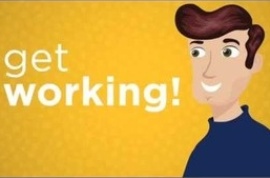
Sara Sutton Fell, CEO of FlexJobs, which provides legitimate, professional telecommuting and work from home jobs that promote work-life balance.
Are you considering a transition to or looking for resources on work from home jobs? Where do you begin the search, and how do you find safe, reliable job listings? We got a chance to conduct a follow-up interview with Sara Sutton Fell, the founder and CEO of FlexJobs to learn more about telecommuting roles, tips on how to spot spam listings, and the dynamic of work from home jobs today.
To recap, Sara Fells first started FlexJobs when she was pregnant with her first child and searching for a job that would allow her to balance her home and work life. Finding a number of telecommuting scams instead, she was inspired to find a resource for others that would allow reliable, legitimate job offerings. Thus, FlexJobs was born and is the helpful resource it is today for many job seekers searching for telecommuting roles. Find part one of the interview here.
1. How has the environment of work from home jobs changed from the start of FlexJobs to its current day?
Back in 2007 when we founded FlexJobs, working from home was just starting to become part of most people’s professional worlds. People may have known someone (or knew someone who knew someone) who worked from home, but it was still relatively new. Today, working from home is a common strategy used by companies looking to recruit and retain the best professionals, and the chances are very good that we all know someone who works from home at least part of the time. To give you some perspective, in 2009, we regularly posted about 4,000 available job listings on our site (including telecommuting and other flexible jobs). Today, we’re consistently posting over 13,000 available jobs.
2. Work from home jobs change the traditional office dynamic. Instead of spending all of one’s working hours in a group of co-workers, a person working from home has more flexibility in when and how to connect. What are some ways to maintain strong communication while working from home? How does this flexibility benefit workers?
I honestly think that communicating with coworkers when you work from home is very similar to when you work from an office. At least over the last several years, office-bound workers communicate through phone and email most of the time, with in-person meetings and impromptu stop-bys also included.
So the main trick is to figure out what parts of communication are missed when you work from home, and figure out ways to supplement those. Informal conversations in hallways and break rooms are a good example. Instead of this, telecommuters have to consciously make the decision to start “small talk” conversations with each other. Good managers of telecommuters are, on a daily basis, looking for ways to start these casual conversations.
Tools like instant messenger, company message boards like Yammer, and traditional tools like phone and e-mail are all great ways to encourage these types of conversations. At FlexJobs, our team talks regularly through Yammer and has lively discussions about food, movies, family, vacations, and other water-cooler topics. And we manage to fit in some great, collaborative, work-related conversations, too!
3. What would you describe is the main benefit of changing to a telecommuting role based on your personal experience?
There are two answers for this – one for employers and one for employees.
As an employee, I have to say the main benefit is freedom or control. The ability to trade your daily commute for a home office means more time for whatever it is you want out of life- family, hobbies, friends, you name it. It may not seem like much, but because I work from home, I’m able to bring our two young sons to school, and pick them up when their school day is done. These moments are priceless to me and it’s because I work from home that I get to enjoy them.
For employers, the benefits have to do with productivity and cost-savings. Several studies have come out over the last couple years clearly showing that telecommuters are more productive, more efficient, more satisfied, and less likely to quit than office-bound professionals. And employers, by letting their workforce work from home, save huge amounts on real estate, technology, turnover, and missed productivity.
4. Spam and false advertising are one of the biggest complaints of job seekers looking for work from home positions. How can they spot a bad job listing? How does FlexJobs help job seekers find quality jobs?
Scam jobs take many forms, so it’s important for job seekers looking for telecommuting or work from home jobs to do their homework and stay aware. Here are some of the ways to spot a scam job:
1. Be careful of the keywords you use to search. “Work from home” is a phrase associated with lots of scams and pyramid schemes. Instead, try safer words like “remote work,” “telework,” and “telecommuting.”
2. Be aware of the warning signs of scam jobs: Jobs are almost certainly a scam if they promise easy money for easy work, if they require you to “invest” or pay a fee to get the job, or if they use all capitalized letters or lots of !!! and $$$ punctuation.
3. Know the most-used scams: Common work-from-home scams include repackaging products, survey taking, stuffing envelopes, and building crafts. If it sounds too good to be true, it is.
4. Be cautious about unsolicited e-mails: E-mails from unknown sources that promise to find you work-from-home jobs should be ignored completely, and of course deleted.
5. If you think you’ve found a scam, ask yourself these questions to be sure:
- Is the hiring company’s name listed in the job listing?
- Do you need to pay to get the job?
- Does the job listing sound too good to be true?
- Does the company ask you to provide your social security number, driver’s license number, credit card number, or bank information?
- Does the job sound like any of the following common work at home scams? Unsolicited contact, wire transfer, stuffing envelopes, data entry, assembly work, multi-level marketing or pyramid scheme, shipping manager, rebate processor
FlexJobs’ mission is to provide job seekers with a safer job search experience while they look for telecommuting jobs and other flexible jobs. We have a team of job researchers who spend a combined 50+ hours every day searching for legitimate telecommuting jobs. They weed through scams to find new job listings and employers, then screen each employer to make sure they’re a legitimate company offering a real job. Only then is the job posted to FlexJobs, so job seekers who use our site are guaranteed to find only legitimate telecommuting and flexible jobs.
5. How have employer attitudes changed towards work from home jobs in recent years? What has caused more employers to offer flexible jobs to their employees?
For one, technology has advanced by leaps and bounds so it’s much easier for employers to have a remote workforce. Internet speeds are much better, personal computers and business networks are very advanced, and the average professional’s knowledge of and competence with office technology has greatly improved.
Management styles have also changed which is necessary for a thriving at-home employee base. Employers rely less on the “I need to see you working to know you’re working” model and managers are better prepared to manage employees remotely.
And finally, employers are seeing huge cost benefits to offering flexible jobs. The Telework Research Network has an inspiring list of the cost benefits of letting employees telecommute – http://www.teleworkresearchnetwork.com/resources/costs-benefits.













